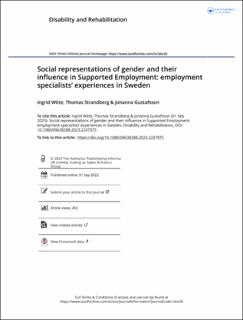Social representations of gender and their influence in Supported Employment: employment specialists’ experiences in Sweden
Peer reviewed, Journal article
Published version
Permanent lenke
https://hdl.handle.net/11250/3116131Utgivelsesdato
2023Metadata
Vis full innførselSamlinger
- Publikasjoner fra Cristin [3269]
- SPS - Documents [424]
Sammendrag
Purpose: Gender differences have been found in the outcomes of vocational rehabilitation (VR) and
in Supported Employment (SE), therefore, the purpose of this study was to explore employment
specialists’ (ES) social representations of gender in relation to work and VR and how these social
representations influence the ES’s work in the VR process according to SE.
Methods: The qualitative method of focus group discussions was employed. Ten focus groups were
held with 39 ESs from four categories of SE organizations in Sweden. Topic analysis was applied to the
transcribed material from the focus groups.
Results: Five themes with different social representations about gender and disability in relation to VR
and working life formed in the analysis: (1) differences in personal and health factors among
VR-participants, (2) gender norms in society influencing VR, (3) energy-intensive environmental issues
influencing VR, (4) gender-specific interactions in VR, and (5) gendered paths in the welfare system.
Conclusion: Social representations of higher strains on women with disabilities compared to men with
disabilities both in private and working life, which reflect the lived experiences of the ESs, is a possible
explanation for gender differences in VR and working life for persons with disabilities.

